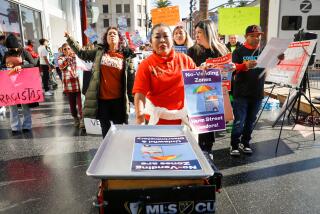Intel Customer Delinquent on $470-Million Bill : Computers: The chip maker won’t say who it is, but analysts say Packard Bell has a history of operating on thin margins.
In an unusual indication that a leading personal computer manufacturer may be suffering a serious cash squeeze, computer chip giant Intel Corp. has reported that one of its five largest customers has fallen far behind in paying an outstanding bill of $470 million.
Intel declined to identify the customer. But industry analysts pointed out that privately held Packard Bell Electronics Inc., which currently leads the industry in retail sales volume, has a long history of operating on razor-thin margins. The company declined to comment.
Intel, which supplies the 486 and Pentium microprocessors that power most personal computers, has taken the highly unusual step of converting a portion of the $470-million receivable to a loan, according to its third-quarter filing with the Securities and Exchange Commission.
Such a measure would appear to indicate that Intel fears the customer might be unable to pay if Intel insisted on immediate payment. Of its largest customers, a group that also includes Compaq, IBM, Hewlett-Packard, NEC and Acer, only Packard Bell might conceivably be experiencing a cash shortage.
Things have often been tight for the company, which was based in Westlake Village before moving to Sacramento in the wake of the Northridge earthquake. While Packard Bell was a pioneer in selling PCs through mass-market consumer electronics channels and is a favorite with first-time PC buyers seeking the latest multimedia features at rock-bottom prices, many analysts and competitors have long suspected that the company is not profitable.
In May, 1992, Packard Bell shelved an initial public offering set to raise $70 million in cash. The company blamed the retreat on the volatility of the equity market, but investors may also have been spooked by the company’s $93.3 million of debt.
A year later, the company found another source of cash: France’s Groupe Bull was given a 19.9% stake in the company for an undisclosed sum. At the same time, Packard Bell secured a $70-million line of credit from Congress Financial Corp. in New York.
Early this year, Packard Bell was said to be looking for a buyer. In July, NEC, the leading supplier of PCs in Japan, invested $170 million in Packard Bell in return for a 19.99% stake and a seat on its board of directors. At the time of the investment, Packard Bell Chief Executive Beny Alagem confirmed that the company had been seeking an acquisition. “This should remove the rumor of acquisition with any other party,” Alagem said.
The Bull and NEC investments are in some ways analogous to the cash infusion that AST Research received from Samsung Electronics of Korea. Just as AST was forced to turn to Samsung a second time and effectively cede control of the company when its cash problems worsened, so Packard Bell would likely turn to NEC in a crisis. The Japanese company could thus gain more control of a company with a strong following in the U.S. PC market, a market that NEC has tried unsuccessfully to penetrate on its own.
The fact that one of the industry’s top manufacturers is having trouble making ends meet might be an indication that PC sales are slowing. But Brad Smith, an industry analyst for Dataquest Inc., rejected that theory.
“What’s we’re seeing is not a slowdown in demand, but companies overbuilding trying to prepare for the Christmas blitz,” he said “The worst thing that can happen is be caught short on product during the holidays.”
Any inventory not sold during the holidays will be unloaded at fire sale prices before spring, something that manufacturers find preferable to running out as they did last season, Smith said.
But that can make for difficult business conditions short-term, especially for those companies low on cash.
“This is a tough time of year,” said one PC maker who declined to be named. “You’re shipping out a lot of product and you’re not getting paid for it yet. Things are very tight right now.”
Things are not exactly tight at Intel, which is enjoying record profit and earnings, but the bad debt problem drove the company’s stock down $3 to close at $60 in very heavy Nasdaq trading Monday. The company said that the amount owed represents about 14% of its accounts receivables, and that it is “closely monitoring” the situation.
More to Read
Inside the business of entertainment
The Wide Shot brings you news, analysis and insights on everything from streaming wars to production — and what it all means for the future.
You may occasionally receive promotional content from the Los Angeles Times.






